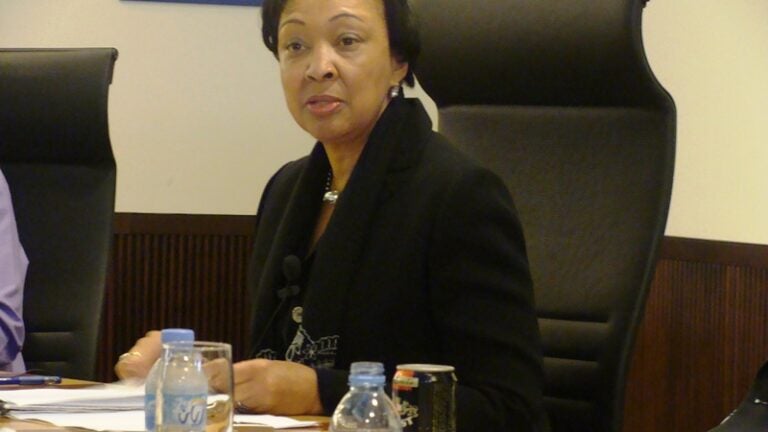Dialogue Series, Regional Studies
The Kofi Annan Legacy for Africa

Gwen Mikell, Professor of Anthropology and Foreign Service at Georgetown University, gave a CIRS Focused Discussion on the subject of “The Kofi Annan Legacy for Africa” on November 2, 2011. She noted that the lecture grew out of a project that she began in 2006, where she was invited to write about Kofi Annan’s African initiatives over his two terms in office as Secretary General of the United Nations. With support from Georgetown University and the Carnegie Corporation, Mikell’s goal was to investigate, from an anthropological perspective, the impacts Annan’s initiatives had in Africa.
Mikell outlined the extent of her research on Annan’s initiatives in four areas: African human rights, peacekeeping, development and growth, and governance. She stated that her research was centered on much more than just an investigation into Kofi Annan, as she “wanted the research to reflect people’s perceptions and interpretations – the meanings they derived from his leadership. I wanted the research to show how Kofi Annan’s African initiatives were shaped; what their dynamics were; how the international community and African countries had interacted with each other to carry out these initiatives; and, finally, the unique perspectives of different constituencies about his legacy.” This, she explained, was research that differed markedly from the existing biographical works written about Annan’s personal or professional life.
Kofi Annan, Mikell argued, was responsible for a major turnaround in perception regarding African affairs at the United Nations as well as on the international stage. She explained that various historical events, including the shadow of the Cold War, had “left Western countries relatively unconcerned about political instability and human rights issues in Africa.” Although Mikell acknowledged that African countries have long been victim to Western exploitation through selective development and investment, she asserted that “Kofi Annan’s advocacy had put Africans on the international ‘hot seat’ and demanded that they also be responsible national and global leaders and citizens.” Mikell’s research indicated that “universal, Western values such as human rights and democracy were at the core of much of what he did and, therefore, the African initiatives.” These ideals, however, caused a rift in perception between Western UN officials and their African counterparts. Many African heads of state perceived of Annan as a spokesman for, and a product of, the West and so actively supported Boutros Boutros-Ghali to become Secretary General for a second term against Annan’s bid.
Some of the highlights that emerged from the research Mikell conducted included a picture of the UN as a highly fractured institution that entrenched existing group rivalries. As such, to make drastic changes within the UN, Annan was committed to perusing institutional reform. Although these reforms were not always popular, his actions in this area gained him respect from competing groups within the United Nations. Annan outsourced programs in order to give them greater visibility and to avoid giving any one group within the UN the power to dictate policy direction in this regard. During this time, Mikell explained, Annan “was being very productive and creative in things like the Global Fund for HIV/AIDS, tuberculosis, malaria, and other diseases.” His policies thus resulted in the turn towards strengthening social justice, anti-poverty rights, and grass-roots initiatives. Further, in light of certain failures on the part of the United Nations, especially in Rwanda, Mikell examined how Annan “put in place institutions that were extremely important for bringing to justice genocidaires, or military officers, or state officials. He was instrumental in allowing the ICC and the human rights council to classify rape as a tool of war.”
As a final thought, Mikell stated that “Annan’s initiatives were intended to interject elements of equality and socioeconomic justice into the democratizing processes underway within Africa.” Despite these efforts, many of the African leaders thought that the moral authority of the United States during Obama’s administration would have far greater benefits for Africa than was the case. As for Annan, Mikell said, he has exclaimed that being out of office has afforded him more the ability to get things done, and has freed him from the impediments of competing groups.
Gwendolyn Mikell was the Director of the African Studies Program in the Edmund A. Walsh School of Foreign Service at Georgetown (1996-2007); and Senior Fellow in African Studies at the Council on Foreign Relations from 2000-2003. Her research and writing have been focused on political and economic transitions in Africa, and on gender and peace building during African transitions.
Article by Suzi Mirgani, CIRS Publications Coordinator